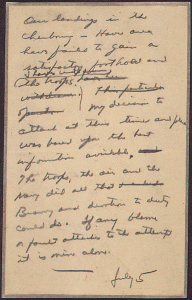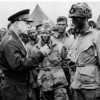D-Day + 70 Years

I originally posted this on June 6, 2008 on the Flashpoint Blog of the American Security Project. I’m re-posting it here today, the 70th anniversary of D-Day.
General Dwight D. Eisenhower, USA, Supreme Commander, Allied Expeditionary Forces, drafted a statement on the eve of the D-Day invasion. He intended to issue it to the press should the invasion fail and be pushed back into the sea.
He wrote:
Our landings in the Cherbourg-Havre area have failed to gain a satisfactory foothold and I have withdrawn the troops.
My decision to attack at this time and place was based upon the best information available. The troops, the Air and Navy did all that bravery and devotion to duty could do.
If any blame or fault attaches to the attempt, it is mine alone.
As I researched my dissertation about President Eisenhower, I came across the statement. I had read it before in various books that told the tale of the D-Day invasion and Eisenhower’s leadership. But what had never occurred to me–or been explained in the accounts I had read–was that Eisenhower corrected his own draft, by hand.
The original draft read:
Our landing in the Cherbourg-Havre area have failed to gain a satisfactory foothold and the troops have been withdrawn.
This operation at this time and place was based upon the best information available. The troops, the Air and Navy did all that bravery and devotion to duty could do.
If any blame or fault attaches to the attempt, it is mine alone.
Note the important edits. After getting the idea on paper, he eliminated the passive voice and he clarified responsibility. Where he could have said, “the troops have been withdrawn,” he instead said, “I have withdrawn the troops.” Where he could have said, “This operation at this time and place,” he instead said, “My decision to attack at this time and place.” He accepted responsibility and he did not pass the buck.
As a recovering editor, I recall working with staff to instill the appropriate contempt for the passive voice. It eliminates the active agent from language and contributes to fuzzy thinking. “Mistakes were made,” is a classic in Washington. Well, who made those mistakes? They didn’t happen just by themselves. Someone, some individual, some person made those mistakes.
What’s so striking about the Eisenhower note is that in it, he eliminated the passive voice to say, clearly, “I made the mistakes.”
I was thinking of this in the last two days, not just because of the D-Day anniversary, but also because the Senate Select Committee on Intelligence finally was able to release its Phase II report on the use and misuse of pre-war intelligence on Iraq.
Since it first became apparent in the summer of 2003 that Iraq did not have weapons of mass destruction, we’ve heard variations on the old refrain of “Mistakes Were Made:” the intelligence was flawed; other intelligence agencies believed that Iraq had WMD; or members of Congress believed the same thing the administration was saying.
But if we go back to Bob Woodward’s account of a key briefing of President Bush in December of 2002, we see the President didn’t believe what he was selling, either. After the briefing by Director of Central Intelligence George Tenet and Deputy Director of Intelligence John McLaughlin, Bush said:
Nice try. . . . I don’t think this is quite–it’s not something that Joe Public would understand or would gain a lot of confidence from.
Woodward continued:
Bush turned to Tenet. ‘I’ve been told all this intelligence about having WMD and this is the best we’ve got?’ From the end of one of the couches in the Oval Office, Tenet rose up, threw his arms in the air. ‘It’s a slam dunk case!’ the DCI said.
Read the context, carefully. Tenet wasn’t saying it was a “slam dunk” that Iraq had WMD. He was saying that the public would buy the argument.
We did. Congress did. The press did.
There comes a time in life when you have to think for yourself. You have to arm yourself with knowledge, trust your own judgment regardless of what others might say, and make informed decisions about your future. Those who look to you for advice and leadership depend on you to be honest, to be a person of integrity, to put country above self.
I’m not looking for an Eisenhower moment in this administration because I don’t believe they made “mistakes.” The Senate report confirms what Scott McClellan alleged in his new book, What Happened. The administration mounted a propaganda campaign against the American people to build the case for war.
That’s not a mistake. It’s a crime.
As we mark the 64th anniversary of D-Day, it’s worth asking if our leadership has been worthy of our country. Some might argue that it doesn’t matter how we went to war because we are there now. But of course it matters. It matters because so many of the same people who took us to war argue that we can’t end it now.
By D-Day, Eisenhower had done everything he could to make sure that the men under his command had everything they needed to succeed. If they failed on the beaches, then he had failed them. He would not try to dodge blame with laments about going “to war with the Army you have, not the Army you want,” as Donald Rumsfeld once said. Eisenhower took responsibility for his leadership.
I miss Ike.

